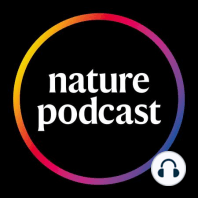30 min listen
Our ancestors lost nearly 99% of their population, 900,000 years ago
FromNature Podcast
ratings:
Length:
14 minutes
Released:
Sep 6, 2023
Format:
Podcast episode
Description
In this episode:00:30 Early humans pushed to brink of extinctionAround 900,000 years ago the ancestors of modern humans were pushed to the brink of extinction, according to new research. Genetic studies suggest that the breeding population of our ancestors in Africa dropped to just 1,280 and didn’t expand again for another 117,000 years. This population crash would likely have had an impact on human genetic diversity, and may have driven the evolution of important features of modern humans, such as brain size.Nature News: Human ancestors nearly went extinct 900,000 years ago3:49 The pollution legacy of Antarctica’s research stationsPoor historical waste practices have left high levels of pollution around Antartica’s research facilities. By surveying the seafloor near Australia’s Casey research station, researchers have revealed high concentrations of hydrocarbons and heavy metals.This pollution is likely to be widespread, but its impact on the continent is unknown.Nature News: Antarctic research stations have polluted a pristine wilderness07:43 Melting sea-ice causes catastrophic penguin breeding failurePersistently low levels of sea-ice around Antarctica have caused emperor penguins to abandon their breeding colonies early, resulting in the death of large numbers of chicks. Although the affected populations only represent a small number of the total emperor penguins on the continent, it’s unclear how they’ll fare if trends in sea-ice melt continue.Science: Emperor penguins abandon breeding grounds as ice melts around them09:23 The AI trained to describe smellsResearchers have developed an artificial-intelligence that can describe how compounds smell by analysing their molecular structures. The system’s description of scents are often similar to those of trained human sniffers, and may have applications in the food and perfume industries. Currently the AI works on individual molecules, and is unable to identify the smells associated with complex combinations of molecules, something humans noses do with ease.Nature: AI predicts chemicals’ smells from their structuresSubscribe to Nature Briefing, an unmissable daily round-up of science news, opinion and analysis free in your inbox every weekday. Hosted on Acast. See acast.com/privacy for more information.
Released:
Sep 6, 2023
Format:
Podcast episode
Titles in the series (100)
Nature Podcast: 9 April 2015: This week, the Moon and her sister, the Sun and its personality, and the latest wonder material to hit the big-time. by Nature Podcast
